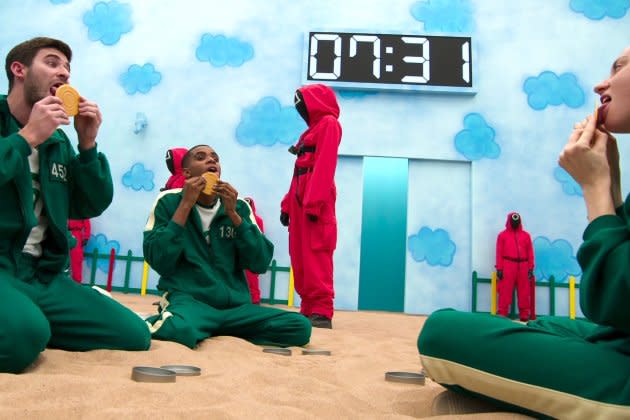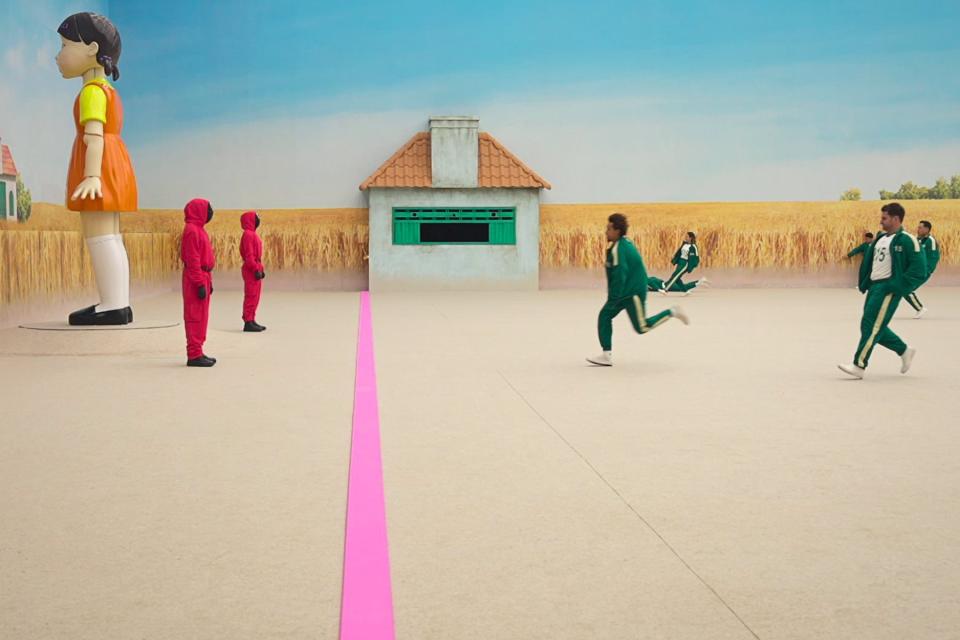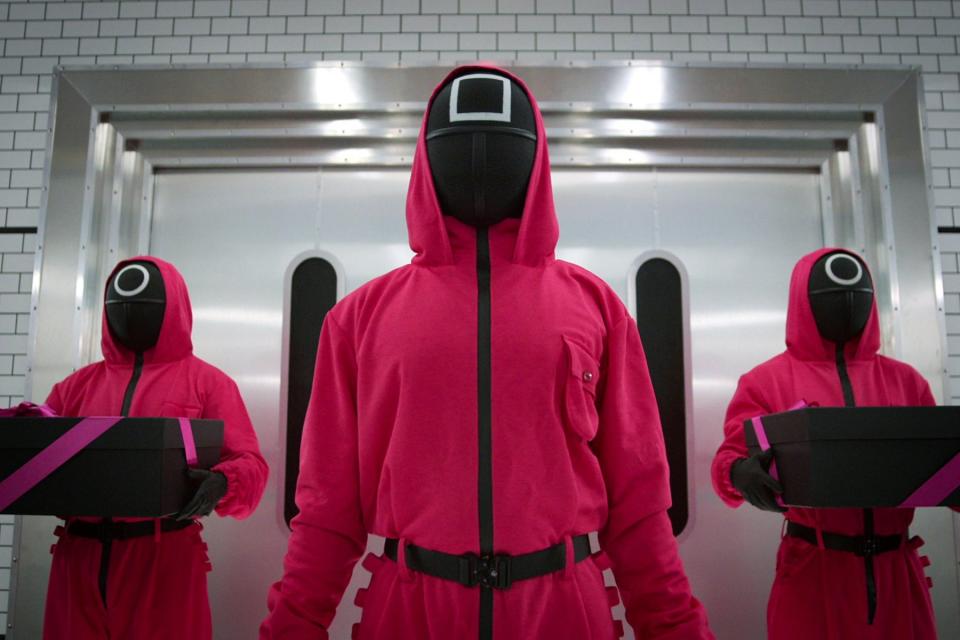‘Squid Game: The Challenge’ Players and Producers Talk Finale and Backlash
- Oops!Something went wrong.Please try again later.

In the final episode of Squid Game: The Challenge, the three finalists swapped their green tracksuits for button-downs and devoured a steak dinner on a triangular-shaped table, much like the dining hall featured in Netflix’s scripted drama Squid Game. Instead of a deadly knife fight, the two final contestants, Player 451 Phill Cain and Player 287 Mai Whelan, played the child’s game Rock, Paper, Scissors to determine the winner of the $4.56 million prize. Whelan, who bragged that the hand game was a personal favorite, was ultimately crowned.
Player 182 TJ Stukes, 39, says he admires Whelan, 55, although she was distrustful in an earlier game. “I’m still human, I was hurt. However, she played the game flawlessly,” Stukes tells Rolling Stone.
More from Rolling Stone
'Leave the World Behind' Director Sam Esmail on 'Friends' and Rogue Teslas
'Dancing With the Stars' Winner Xochitl Gomez Reflects on Her Journey
Squid Game: The Challenge has captivated audiences as 456 real-life players compete in high-stakes kids games for a chance at a life-changing $4.56 million. The game show, which ranked Number One in the past two weeks on Netflix’s Top 10 English TV list, will have a second season, Netflix announced Wednesday.
But its parallels to Netflix’s most popular drama series of the same name and allegations of inhumane conditions within the first game, Red Light, Green Light, have made some viewers question the show’s purpose.
The show’s finalists Whelan, an immigrant adjudicator who approves visa applications, and Cain, a scuba instructor with a psychology degree, both have something in common, said executive producer John Hay.
“They both seem to be good readers of people,” Hay observes.
The two stayed largely out of the spotlight, and in games of chance they relied on their deep-seated alliances and practiced strategy. Executive producer Stephen Lambert says that the loud characters, as with most reality game shows, are often booted first from the show.
“I don’t think our finalists were shy and retiring,” Lambert offers. “Some of them were quite provocative characters. They were also quite skilled characters. I was particularly impressed by Phill’s skill in playing the last game before they came to the final, The Circle of Trust. Twice he had to work out who had put the coffin on his desk, and twice he got it right, which was pretty remarkable.”

The executive producers shared that the show didn’t seek wallflower characters but complex individuals who were prepared to be unapologetic with strong aspirations and desires to win the challenge. (The show conducted casting in the U.S. and London, and received around 81,000 applications.)
“You can’t tell a story like this unless you’re concentrating on a few characters,” Lambert says. “We knew we couldn’t do that. Whenever we started trying to focus on characters they would be eliminated.”
Lambert acknowledges that the reality show has received backlash for missing the point of the original series that criticizes capitalist, money-hungry societies. He was most fascinated by the show’s insight into human interactions.
“I don’t think we were setting out to say something in that heavily didactic way,” Lambert adds. “We were setting out to discover something. We were setting out to discover how people reacted in this extraordinary situation.”
In an earlier Rolling Stone report, former contestants alleged some players were pre-selected to move on to the next round, while others were given dummy microphones as cameras trained on other active characters.
The series paid particular attention to the mother and son duo, Player 302 LeAnn Wilcox Plutnicki and Player 301 Trey Plutnicki. Trey, 25, tells Rolling Stone that the game was fair, “and I don’t think there’s anyone that made it through that shouldn’t have made it through.”
He also calls the show emotionally, physically and mentally taxing, especially ahead of the marbles game where he competed head-to-head against his mother.
“The nature of eliminating your mom in one of these games is crazy, especially when the stakes are that high,” he says. “And also, there’s a lot of emotional backstory between the two of us just in life, like we grew up playing games around the kitchen table. So it kind of brought us full circle in this moment.”
Other players say they did not have a positive experience.
Four former players told Rolling Stone earlier this year that the Red Light, Green Light game took place in inhumane conditions, claiming they spent up to nine hours in freezing temperatures and had to stay still for 30-minute periods. At least 10 players collapsed during the game, according to sources in the Rolling Stone report, and medics were delayed in an effort to preserve the camera shots.
Netflix previously confirmed that three contestants sought medical attention for minor conditions. Executive producer Hay told Rolling Stone that the temperatures were cold, not freezing, and that the game lasted two to five and a half hours.
“I’m not surprised that some people were disappointed because it’s tough,” Hay says. “It’s a tough game.”
Two unnamed players have threatened legal action with a British law firm after suffering hypothermia and nerve damage. The firm, Express Solicitors, has sent letters of claims to Studio Lambert, a co-producer on the competition show. No lawsuit has been filed, according to an Express Solicitors spokesperson. Contestants viewed the game as a “David and Goliath battle” and thought the game would be fun, wrote Express Solicitors accident specialist Daniel Slade in a statement, but they didn’t expect to suffer.
“From what we’ve been told, they pushed the boundaries of safety in the name of entertainment,” Slade wrote.
Player 339 Aurora Lofton, 27, tells Rolling Stone that because of her traumatic experience during the marbles game, she’s been unable to watch the episodes. Netflix invited Lofton to be a part of the show, and despite having mixed feelings about the violent drama series, she says she had the skills to be a strong competitor.
During the marbles game, Lofton and Player 065 Dylan Scanlon spent 18 of 20 minutes trying to decide on what marbles game to play. Once the two decided on a game with two minutes to spare, it ended in a tie and they were both eliminated. Lofton describes Squid Game: The Challenge as a toxic environment where she felt gaslit and reminded of the hurdles she faced as a Black girl growing up in predominantly white Northern Virginia.
“I wouldn’t go as far as to say I regret the experience for all the reasons that I just described, but it was not positive,” Lofton says. “It has been extremely triggering, and it’s been extremely difficult to relive this with the world watching.”

Lofton says she would not reenter the game if given the opportunity and questions whether the isolation from her family and starvation was all worth it.
“Everyone is drinking this Kool-Aid that it was the best experience of their life,” Lofton adds.
The show was filmed over 16 days in London across six stages, and contestants lived in a bunk bed-filled dormitory. Player 176 Darius “The Barbarian” Wilson, 27, specifically remembers the prison-like meals served inside: porridge for breakfast, pasta and peas for lunch, and boiled chicken and potatoes for dinner. To Wilson, leaving his home, social media and his friends to participate in the immersive game was worth the risk.
“You could turn it off and continue to live your normal lives, but this is something that we can’t run away from, and it’ll change most of our lives,” Wilson says. “I could give up today, go home and regret for the rest of my life that I didn’t even try to win $4.5 million or I could do what it takes.”
Half a dozen players told Rolling Stone that despite the “life and death” experiences, they’d give the game another chance. Casting for the sequel was announced Wednesday along with a fan experience: “Squid Game: The Trials” in Los Angeles. A video game is even in the works.
The show’s antagonist, Player 432 Bryton Constantin, says he didn’t complain about the frigid temperatures in Red Light, Green Light or the flavorless food because he was told the challenge ahead was not going to be easy.
“We know we’re not going to do some beautiful dating show or Selling Sunset,” Constantin, 23, says. “It’s not going to be a walk in the park.”
Best of Rolling Stone

